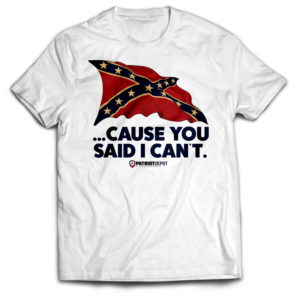 A curious pathology among paleoconservatives and their reactionary brethren is to embrace and even celebrate their status as ‘deplorables.’ I earlier mentioned the strange do this to antagonize your liberal acquaintances phenomenon. On the one hand, this t-shirt and its ilk are more of the same, but on the other hand, it has a unique argumentative element to it.
A curious pathology among paleoconservatives and their reactionary brethren is to embrace and even celebrate their status as ‘deplorables.’ I earlier mentioned the strange do this to antagonize your liberal acquaintances phenomenon. On the one hand, this t-shirt and its ilk are more of the same, but on the other hand, it has a unique argumentative element to it.
Here’s my shot. The argument is an enthymeme.
You said don’t [fly/wear Confederate flag stuff]
Therefore, I will/should wear it.
The suppressed premise, as far as I can tell, can either be strong or weak.
Strong: I will/should do the opposite of whatever you say.
Weak: Your views on Confederate stuff is wrong, so I must resist it symbolically, indexed to the things you’ve said.
I take it that the ‘you’ is roughly me, or folks of my type — progressive, weirded out by Antebellum South nostalgia, educated elitist, and so on.
Two quick things. #1. I don’t think anyone said “can’t” in any robust sense. I might so so far as to say “shouldn’t” in a moral sense, but wearing a dopey shirt like that isn’t illegal, and it’d be bonkers to say that a relevant sector of liberals have denied that or have tried to make it illegal. #2. Perhaps there’s a confusion between (a) flying the Confederate flag around one’s house or having a bathing suit made of it and (b) flying it at, say, a courthouse or having it on the state flag. In the latter case, that’s the state endorsing a particular worldview by putting a symbol out to represent it. That’s a no, there. And I’d say that there’s a good reason to argue for “can’t” there.
The upshot of the two quick things is that the shirt is either a response to a “can’t” that was never said, or to a “can’t” that is irrelevant to the shirt. <deep sigh>
The argument in the background, regardless of the dialectical miss, is interesting. On the strong interpretation, I think the paleoconservative here is using the George Costanza Rule — that every instinct he has is wrong. So he should do the complete opposite.Â
Liberals, so the reasoning goes, have the exact opposite reaction to every circumstance. So one has an exemplar, but a bizarro exemplar — just do the opposite of what the liberal does, or says.
The weak interpretation is that liberals are just wrong on the Confederate stuff, so there needs to be symbolic resistance, particularly in the form of overtly breaking a rule… that is calling attention to the rule as you break it. And thereby, making one’s rejection of the rule manifest.
The trouble is that both of these programs, and the strong program in particular, has a kind of slavishness (ironic!) to them — their content and timing is determined by those they are meant to resist. If your identity as a paleoconservative is that of just shouting ‘stop’ at all the liberal/progressive stuff happening, then notice how your life is getting determined by those you hate. The whole point of sane conservatism, as I see it, is to appreciate the old things, to revel in the sacred. But once those things can be sold to you as a thing that can go on a T-shirt as a piece of expressive resentment, it’s too late. Right?
The point I’m getting to is that what makes this reactionary conservative line so strange, and the argumentative core of this particular instance especially, is how it seems a betrayal of what makes conservatism appealing in the first place — appreciating the civilizing sentiments, developing the capacities of neighborliness, and the knowledge that inherited things are conflicted. (As Roger Scruton says: “never look too closely at the things you inherit”). This is the reason why I not only see these gestures as pathologies of public reason, but I see them as pathological even on conservative grounds. They are a kind of performative self-refutation of a brand of conservative politics — in enacting it, you show the ideals you stand for to either be idols or mere words.